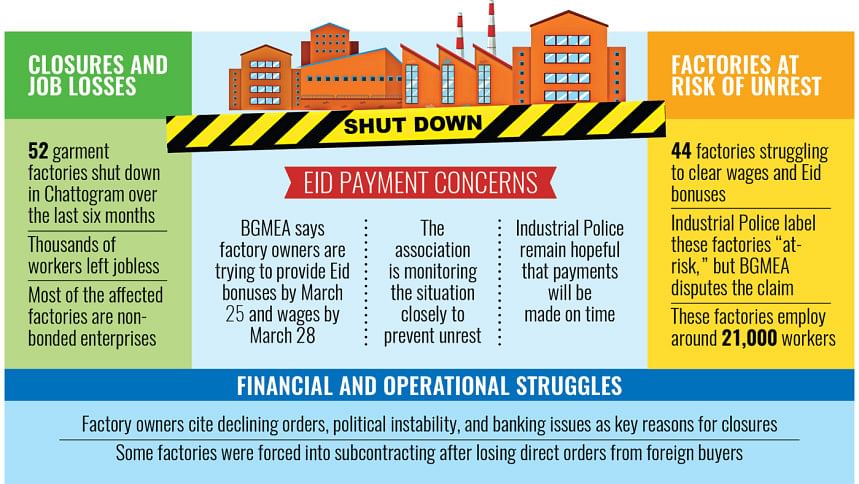52 subcontract RMG factories in Ctg shut over order slump

At least 52 garment factories, both small and large, have closed in the past six months in Chattogram thanks to a 25 percent drop in work orders amid political instability, according to Industrial Police sources.
This has left thousands of apparel workers jobless.
Besides, 44 more factories are struggling to pay worker wages and bonuses ahead of the Eid. The Industrial Police has labelled these factories "at-risk", a claim disputed by the Bangladesh Garment Manufacturers and Exporters Association (BGMEA).
Of the 611 registered garment factories in Chattogram, the BGMEA says only 350 are currently operational. Of them, some 180 are fulfilling foreign orders, while 170 working as subcontractors.
However, statistics from Chattogram Industrial Police-3 show 528 out of 580 garment factories associated with the BGMEA, the Bangladesh Knitwear Manufacturers & Exporters Association (BKMEA) and the Bangladesh Textile Mills Association (BTMA) are operational in the port city.
Sources say at least 52 of these factories have closed in the past six months due to a lack of orders and turmoil related to the political changeover.
"The closures were due not only to declining orders, but also political issues and banking complexities," Rakibul Alam Chowdhury, former vice-president of BGMEA Chattogram, told The Daily Star.
He said most of the affected factories were non-bonded enterprises.
The owner of a closed garment factory in the Mohra area of Chattogram, speaking to The Daily Star on condition of anonymity, said, "Since August 5, our factory has been looted repeatedly. Therefore, we were forced to shut down the factory."
This echoed the BGMEA leader's assessment.
The BGMEA leader said they did not support the "at-risk" label assigned by the Industrial Police to some garment factories.
"No factory owner deliberately withholds wages and benefits from workers, and there is still time to clear dues," the leader said. "Factory owners are trying to provide Eid bonuses by March 25 and wages by March 28, with the BGMEA closely monitoring the development."
According to Industrial Police, concerns have been raised about payments before Eid in 44 garment factories in Chattogram. Police said many of these factories had faced protests over wage issues in the past.
The 44 factories employ around 21,000 workers. These include eight in Kalurghat BSCIC, six in CEPZ, six in Double Mooring, five in Pahartali, three in KEPZ, three in Bayezid, and 13 in urban and suburban areas.
Factories face severe financial crises due to delayed shipments, reduced orders, and unpaid wages from previous months, heightening worker dissatisfaction.
Some previously worked directly with foreign buyers but were forced into subcontracting, only to face further order shortages. Internal worker conflicts have worsened the situation.
Santosh Mondal, a worker from a recently closed factory in Pahartali, said he had been struggling to find a job for two months as factories were no longer hiring.
MDM Mohiuddin Chowdhury, a BGMEA administrative committee member, said order declines and financial struggles from delayed shipments had forced many closures. New regulations requiring employers to pay earned leave, two months' wages, and bonuses simultaneously had further strained them.
"No factory owner wants to stop paying wages. Even with fewer orders, they want to retain workers. We are working to prevent unrest during Eid," he said, adding that political instability had pushed foreign buyers toward alternative countries.
Md Jasim Uddin, senior assistant superintendent of Chattogram Industrial Police, said, "We have identified 44 at-risk factories, but this does not mean they won't pay. These factories have faced similar issues before, and we are hopeful the crisis will be resolved."

 For all latest news, follow The Daily Star's Google News channel.
For all latest news, follow The Daily Star's Google News channel. 








Comments